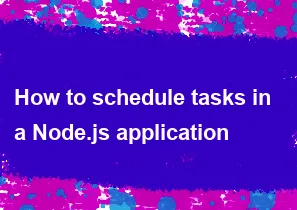How to schedule tasks in a Node.js application

In a Node.js application, you can schedule tasks using various libraries. One popular choice is the "node-cron" library, which allows you to run cron-like scheduled tasks in your Node.js application. Here's a step-by-step guide on how to schedule tasks using node-cron:
Install node-cron: You can install the library using npm:
bashnpm install node-cronCreate a Node.js script: Create a new file (e.g.,
app.js) for your Node.js script.Require the node-cron library: Include the node-cron library at the top of your script:
javascriptconst cron = require('node-cron');Define the task you want to schedule: Create a function that represents the task you want to run periodically:
javascriptfunction myTask() { console.log('Task is running at:', new Date()); // Your task logic goes here }Schedule the task using node-cron: Use the
cron.schedulemethod to schedule your task. Specify the cron expression that defines when the task should run. For example, to run the task every minute, use'*/1 * * * *':javascriptcron.schedule('*/1 * * * *', myTask);The cron expression follows the pattern
second minute hour day month. In the example above,*/1means every minute.Run your Node.js script: Start your Node.js script to see the scheduled task in action:
bashnode app.js
Now, your task will run according to the specified cron expression. You can customize the cron expression based on your requirements. For more complex scheduling, you can refer to the cron syntax documentation.
Here's a complete example:
javascriptconst cron = require('node-cron');
function myTask() {
console.log('Task is running at:', new Date());
// Your task logic goes here
}
// Schedule the task to run every minute
cron.schedule('*/1 * * * *', myTask);
Make sure to adapt the cron expression and task logic according to your specific requirements.
-
Popular Post
- How to optimize for Google's About This Result feature for local businesses
- How to implement multi-language support in an Express.js application
- How to handle and optimize for changes in mobile search behavior
- How to handle CORS in a Node.js application
- How to use Vue.js with a UI framework (e.g., Vuetify, Element UI)
- How to configure Laravel Telescope for monitoring and profiling API requests
- How to create a command-line tool using the Commander.js library in Node.js
- How to implement code splitting in a React.js application
- How to use the AWS SDK for Node.js to interact with various AWS services
- How to use the Node.js Stream API for efficient data processing
- How to implement a cookie parser middleware in Node.js
- How to implement WebSockets for real-time communication in React
-
Latest Post
- How to implement a dynamic form with dynamic field styling based on user input in Next.js
- How to create a custom hook for handling user interactions with the browser's device motion in Next.js
- How to create a custom hook for handling user interactions with the browser's battery status in Next.js
- How to implement a dynamic form with dynamic field visibility based on user input in Next.js
- How to implement a dynamic form with real-time collaboration features in Next.js
- How to create a custom hook for handling user interactions with the browser's media devices in Next.js
- How to use the useSWRInfinite hook for paginating data with a custom loading indicator in Next.js
- How to create a custom hook for handling user interactions with the browser's network status in Next.js
- How to create a custom hook for handling user interactions with the browser's location in Next.js
- How to implement a dynamic form with multi-language support in Next.js
- How to create a custom hook for handling user interactions with the browser's ambient light sensor in Next.js
- How to use the useHover hook for creating interactive image zoom effects in Next.js